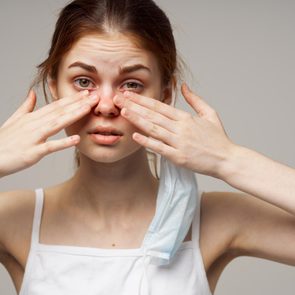Knowing the symptoms of a scratched cornea and seeking care immediately will help stave off lasting vision loss. Here's what ophthalmologists want you to know about scratched cornea symptoms.
9 Scratched Cornea Symptoms and What They Mean
How to tell if you have a scratched cornea
If you’ve ever scratched your cornea, you know firsthand just how painful this eye injury can be.
Your cornea helps your eye focus light so you can see clearly, but it is also packed tightly with nerves and nerve endings, which is why even a small nick can be excruciatingly painful.
What is a scratched cornea?
Your cornea has several different layers, explains Christopher J. Rapuano, MD, the chief of the cornea service of Wills Eye Hospital and a professor of ophthalmology at Sidney Kimmel Medical College of Thomas Jefferson University in Philadelphia.
“In general, think of it as a wall with wallpaper, and when the wallpaper comes off, you have a scratched cornea,” he says.
Some scratches are small and will heal on their own, while others cut deeper and can lead to severe eye inflammation known as keratitis and/or vision loss without prompt and aggressive treatment.
(These are 9 subtle signs of a dangerous eye infection.)

Scratched cornea causes
There are many things that can scratch your cornea, including:
- fingernails
- dry or dirty contact lenses
- pets
- tree branch injury
- foreign objects in your eye
- dirt
- sand
- chemicals
- vigorous eye rubbing
- chronic dry eye
Anything that pokes your eye can cause a scratched cornea, Dr. Rapuano says.
Scratched cornea and infection risk
These scratches can be dirty, meaning they are more likely to become infected with bacteria, viruses, fungi, or parasites, explains cornea specialist Stephanie Marioneaux, MD, a clinical spokesperson for the American Academy of Ophthalmology and an assistant professor at the Eastern Virginia Medical School in Norfolk, Virginia.
“It’s important to see an eye specialist as soon as possible to get ahead of any infection or treat one early before it causes vision loss,” she says.
Contact lenses increase your risk for infection for two reasons.
“Contact lenses create an ideal environment for brewing bacteria by decreasing the amount of oxygen to the front of the eye and because people are frequently touching their eyes (sometimes without the best hygiene),” says Rupa Wong, MD, an ophthalmologist in Honolulu.
“If worn when there is a scratched cornea (corneal abrasion), it can lead to an infection.”
Scratched cornea symptoms
Is it a scratched cornea? Scratched corneas can cause a host of symptoms, including:
Extreme pain
A scratched cornea hurts so much you may not be able to open your eye or tolerate light. “Every time you blink, your eyelid is rubbing against the scratch,” Dr. Rapuano says.
This is why it feels worse when you open or close your eye. The intense pain is due to the many nerve endings in your cornea. There are hundreds of times more pain receptors in your cornea than in your skin, according to the American Academy of Ophthalmology.
If the pain is severe, an over-the-counter non-steroidal anti-inflammatory medication like Motrin can help, Dr. Marioneaux says.
Foreign body sensation
If you have a scratched cornea, you may feel like there is something still lodged in your eye.
Whatever you do, don’t try to remove it on your own, Dr. Marioneaux warns. You could end up increasing your risk for infection.
“Keep your eye closed, wash your hands, and get right over to the ophthalmologist or emergency room for an evaluation,” she says.
(These are 11 signs your eyes could be in danger.)
Gritty feeling
A scratched cornea can feel like there’s sand or grit in your eyes, Dr. Rapuano says. (Dry eye syndrome is actually the most common cause of gritty eyes.)
Tearing
Your eye may shed tears uncontrollably if you develop a scratched cornea, as tears are your body’s way of trying to heal your eye naturally, Dr. Wong notes.
Redness
A scratched cornea can trigger inflammation in your eye, and it can appear red as a result, Dr. Rapuano says.
Vision problems
Not all cornea scratches affect your sight, he says. “A little scratch at the edge of your cornea may not affect your vision, but if the scratch is in the center of the cornea, it may result in blurry vision.”
If the scratch becomes infected, vision loss is more likely, Dr. Rapuano says. This is known as infectious keratitis.
(These are 12 signs you need to visit an eye doctor.)
Swollen eye lids
Your eyelids may be swollen depending on the size of scratch, he says. “If it is a huge scratch, your eyes may become swollen shut.”
Sensitivity to light
You may become sensitive to light if your cornea is scratched, Dr. Wong says.
Headache
Sometimes a scratched cornea can cause a headache, largely due to increased light sensitivity, Dr. Rapuano explains.
Diagnosing scratched corneas
If you think you have a scratched cornea, see an eye doctor as soon as you can.
Your eye doctor will use yellow-orange fluorescein eye drops to allow for a better look at your cornea with an instrument called a slit lamp. You may also receive an anesthetic to temporarily ease pain.
“This exam will also make sure there is no other damage to your eye,” Dr. Rapuano says. It could be a corneal laceration. “This is a cut in the wall, not just the wallpaper, and is extremely serious.”
Scratched cornea treatment

For an otherwise uncomplicated scratched cornea, your doctor will likely prescribe antibiotic drops or ointment. “A small scratch heals in 12 to 24 hours; a bigger one will take a week or longer to heal,” Dr. Rapuano says.
If an infection develops, stronger eye drops will need to be administered every few hours. “This requires very close follow-up,” he says.
Sometimes corneal scratches can recur, he says. “The scratch may heal, but if your eyelid sticks to the area, it can become aggravated.” In these cases, your eye doctor may suggest an ointment that coats behind your eyelid to stave off such repeat trauma.
Scratched corneas are preventable with protective eyewear when playing sports, doing yard work, using chemicals, and taking good care of your contact lenses, according to the American Academy of Family Physicians.























